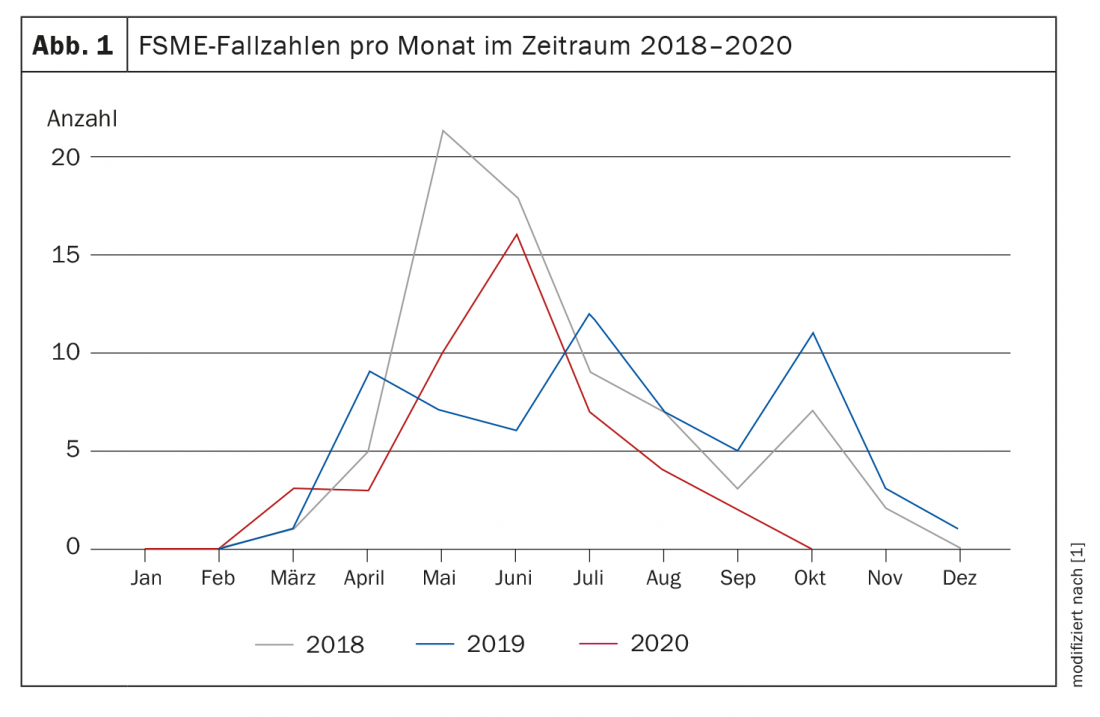The season when ticks are particularly active begins in March and ends in November, depending on weather conditions. In the context of the corona pandemic and the associated standoff rules, more people are spending leisure time outdoors and therefore have an increased risk of exposure. In Switzerland, all cantons except Geneva and Ticino are considered TBE risk areas. Vaccination provides simple and reliable protection.
Looking at the number of cases over the past three years, it is noticeable that they have increased in the critical time window of the summer months since 2018 (Fig. 1). TBE vaccination is recommended by the Commission for Vaccination Questions and the Federal Office of Public Health (FOPH) for all adults and children aged 6 years and older living in Switzerland who reside or temporarily reside in a TBE risk area [1]. For these groups of people, the costs are covered by the mandatory health insurance. Vaccination of children aged one to five years must be considered on an individual basis [1]. If you are in risk areas for professional reasons, your employer must pay for the vaccination.
Health officials call for tick prophylaxis
Furthermore, officials draw attention to the special constellation during the corona pandemic: on the one hand, people spend more time outdoors due to corona and thus have an increased risk of exposure, and on the other hand, the willingness to be vaccinated may be reduced due to fear of a SARS-CoV-2 infection during consultations. However, the diseases transmitted by ticks are also anything but harmless. The two most important are Lyme disease (caused by Borrelia burgdorferi) and viral tick-borne meningoencephalitis, also called early summer meningoencephalitis (TBE) [2]. There are different courses, with approximately one in two affected individuals suffering from permanent sequelae after meningoencephalomyelitis [3]. While Lyme disease can be treated with antibiotics, there is no specific treatment for TBE – but a safe and well effective vaccination is available.
Vaccination protects very reliably
In Switzerland, the two vaccines TBE-Immun CC® and Encepur® are currently licensed for adults and children [4,5]. Both products contain inactivated TBE viruses and, as an excipient, aluminum hydroxide, which enhances the immune response. Three doses of vaccine are required for complete basic immunization. Temporary protection is achieved after only two doses of vaccine, usually given one month apart. For complete vaccine protection, which ensures vaccine protection for at least ten years with a probability ≥95%, a third vaccination is given 5-12 months (TBE-Immun CC®) or 9-12 months (Encepur®) after the second vaccine dose, depending on the vaccine [2,6]. Booster vaccinations are recommended at ten-year intervals. Vaccination is generally very well tolerated [7]. Local reactions at the injection site usually disappear after 1-2 days. Side effects such as headache, fatigue, or nausea are rare; anaphylactic reactions are very rare (1-2:1,000,000 doses); severe neurologic side effects are also rare (1:70,000 to 1:1,000,000).
TBE virus infection possible despite rapid removal of the tick
In addition to the vaccination, some rules of conduct should be observed: Wearing long pants, closed shoes and using tick sprays can reduce the risk of a tick bite. After spending time outdoors, you should check your body for ticks and, if bitten, remove the tick immediately and disinfect the corresponding area. However, TBE viruses can also be transmitted if the tick is removed quickly. In addition to vaccination and behavioral precautions, a free app can be used that shows the user the current tick danger potential in the field by means of a dynamic warning function. The app was developed with the expert support of the Federal Office of Public Health, the National Reference Center for Tick-borne Diseases and the League for Tick-borne Diseases Switzerland and can be downloaded free of charge from the ZHAW homepage [8,9].
Literature:
- BAG: Tick-borne diseases 2021, www.bag.admin.ch/bag/de/home/krankheiten/ausbrueche-epidemien-pandemien/aktuelle-ausbrueche-epidemien/zeckenuebertragene-krankheiten.html, (last accessed Feb. 23, 2021).
- Infovac: Tick-borne encephalitis (TBE), Nov. 9, 2020, www.infovac.ch/de/impfunge/nach-krankheiten-geordnet/zeckenencephalitis-fsme (last accessed Feb. 23, 2021).
- Toppharm: www.toppharm.ch/krankheitsbild/fsme (last accessed Feb. 23, 2021)
- TBE-Immun® technical information, Swiss Drug Compendium, https://compendium.ch
- Professional information Encepur®, Swiss Drug Compendium, https://compendium.ch
- Federal Office of Public Health (FOPH): Early summer meningoencephalitis (FSME). Bulletin 6/19; 12-14.
- Infovac: Tick-borne encephalitis fact sheet, www.infovac.ch/de, (last accessed Feb. 23, 2021).
- Medixblog: https://medixblog.ch/krankheiten-erkennen/jetzt-ist-wieder-zeckenzeit, (last accessed Feb. 23, 2021).
- ZHAW: www.zhaw.ch/de/lsfm/dienstleistung/institut-fuer-umwelt-und-natuerliche-ressourcen (last accessed 23.02.2021)
HAUSARZT PRAXIS 2021; 16(3): 38












